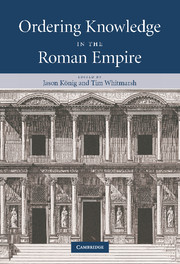Book contents
- Frontmatter
- Contents
- Preface
- Notes on contributors
- List of abbreviations
- Part I INTRODUCTION
- Part II KNOWLEDGE AND TEXTUAL ORDER
- 2 Fragmentation and coherence in Plutarch's Sympotic Questions
- 3 Galen and Athenaeus in the Hellenistic library
- 4 Guides to the wor(l)d
- 5 Petronius' lessons in learning – the hard way
- 6 Diogenes Laërtius, biographer of philosophy
- 7 The creation of Isidore's Etymologies or Origins
- Part III KNOWLEDGE AND SOCIAL ORDER
- Bibliography
- Index
5 - Petronius' lessons in learning – the hard way
Published online by Cambridge University Press: 28 August 2009
- Frontmatter
- Contents
- Preface
- Notes on contributors
- List of abbreviations
- Part I INTRODUCTION
- Part II KNOWLEDGE AND TEXTUAL ORDER
- 2 Fragmentation and coherence in Plutarch's Sympotic Questions
- 3 Galen and Athenaeus in the Hellenistic library
- 4 Guides to the wor(l)d
- 5 Petronius' lessons in learning – the hard way
- 6 Diogenes Laërtius, biographer of philosophy
- 7 The creation of Isidore's Etymologies or Origins
- Part III KNOWLEDGE AND SOCIAL ORDER
- Bibliography
- Index
Summary
Petronius' Satyricon looks like the joker in the pack. Not only is it the one text in this volume to have made the twentieth-century big screen – it's also the only chunk of prosimetric fiction, and perhaps the only work regularly read for fun, or even read much at all. If we can't swallow Petronius' toxic disordering and perversion of systems and ‘facts’, we can decide it's really off our map (and what did we expect from a hyper, Neronian pantomime anyway?). Moreover, questions about how the Satyricon embroiders, applies and tests knowledge, especially when set against the fetishisation and codification of Roman learning in the first century ce, will always jigsaw with debate about what we (can) know about, or learn from, the text itself. As Conte warns of the Satyricon in his History of Latin Literature: ‘Few masterpieces are as shadowy as this … We would do well to keep in mind the extent to which our knowledge and the hypotheses built on it are limited and partial’. The Cambridge History of Classical Literature makes similar claims: ‘No Latin writer excites more lively interest. Unfortunately it is not always accompanied by due recognition of our ignorance’. Slater classifies the fiction as ‘singularly uninterpretable’, Sullivan concedes that it ‘presents more puzzles than any other ancient text’, while Rudich ranks it ‘the most controversial text in all of classical literature’.
- Type
- Chapter
- Information
- Ordering Knowledge in the Roman Empire , pp. 108 - 132Publisher: Cambridge University PressPrint publication year: 2007
- 3
- Cited by

